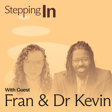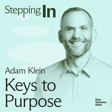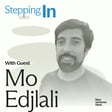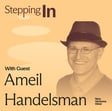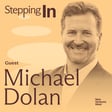Become a Creator today!Start creating today - Share your story with the world!
Start for free
00:00:00
00:00:01

Supporting High Risk Youth
In this episode of Stepping In, Adam speaks with Christy McClendon, a New Ventures West graduate and President/CEO of New Pathways for Youth (NPFY), an organization serving youth living in extreme adversity. NPFY programs aim to break through self-destructive thinking and develop essential skills, empowering youth to achieve their desired future.
In our conversation, Christy explains how NPFY’s youth, mentors, and staff engage in ongoing self-development, whic
Transcript
Introduction to Episode 21
00:00:04
Speaker
This is Adam Klein, managing partner, faculty member at New Ventures West. This is episode 21 of our podcast Stepping In. Podcasts where we delve into how integral coaching can address some of the most pressing issues we face as individuals, as communities, and as stewards of our planet.
Mission of New Pathways for Youth
00:00:22
Speaker
In this episode, I speak with Christy McClendon, CEO of New Pathways for Youth.
00:00:27
Speaker
New Pathways serves youth ages 12 to 21 experiencing poverty and four times the adversity of other youth. Adversities such as parent incarceration, abuse and neglect, substance abuse, and high school dropout. Through one-to-one mentoring in connected communities of other mentors and youth and evidence-based personal development and life skills, retreats and workshops,
00:00:52
Speaker
Their youth create breakthroughs and self-destructive thought patterns that lead to actions consistent with the future they want. They've transformed more than 7,000 lives since their founding. Our conversation begins by exploring in more depth the work New Pathways does with youth in the Phoenix area and looks at how integral coaching is supportive in their efforts.
Challenges Facing the Youth and Overcoming Adversity
00:01:15
Speaker
So New Pathways for Youth is a nonprofit organization working with youth between the ages of 13 to 21 who live in the greater Phoenix community that are experiencing high levels of poverty and adversities. Adversities such as incarcerated parents, homelessness, substance abuse,
00:01:37
Speaker
in the home, emotional, physical, sexual abuse in the home, and our youth are experiencing those adversities at four times the level as other youth in our community. So we're working with a pretty vulnerable high-risk population of youth, and our focus is how we disrupt the chronic poverty and adversity their youth face, that our youth are able to
00:02:02
Speaker
look at themselves and see the greatest possibility of themselves in their future and to start developing the skills and the tools and the supports in their life that will allow them to achieve that greatest possibility of themselves. You know, we live in a world where measurement is oftentimes really important and at new pathways, we do measure our impact with our youth. And there's so much that we can't measure.
00:02:32
Speaker
about our impact with our youth. But one of the ways that I like to help people understand what's happening with the youth that we serve is that the national benchmark for youth experiencing like poverty and adversity to graduate high school is 55%. That new pathways over 95% of our youth graduate high school coming from those same adversities, which I believe is a true testament that when we support
00:03:00
Speaker
and put the supports, the structures of support, help develop the skills that these youth have a commitment to achieve their greatest possibility of themselves and to live a full life without the adversity and without the challenges of poverty and that they are so capable of doing it.
Mentoring and Personal Development
00:03:18
Speaker
So part of the work that we do at New Pathways, I realize, is how do we do that?
00:03:23
Speaker
Is is an important part of that that question of who are we and we do that through personal development life skill development and placing a caring stable adult into the life of our youth.
00:03:37
Speaker
so that they have the support and the guidance needed. So we train volunteer mentors in our community that go through a pretty strenuous volunteer training and orientation process. We match them one to one with a youth, but we match them in a cohort of other youth and mentors so that they create a community.
00:03:59
Speaker
This community of about 35 other mentors and youth matches, so a total community of about 70, becomes a place of belonging, acceptance, and love that so many of our youth are seeking. So it becomes a community that they are able to experience that sense of connectedness that they long for that provides a structure for them to try new things, to experience the world in new ways,
00:04:28
Speaker
to expand their knowing of themselves, their trust in adults, which has oftentimes been so severely broken, and to start to see a future for themselves that they haven't seen as possible before then. So through the powerful combination of personal development, life skills, training, and relationship, we're able to break the cycles of poverty and adversity for our youth. Fantastic.
00:04:57
Speaker
And when you're working with the youth, these mentors seem to be a really critical component of it, as well as the back office. Can you say more about how you're seeing, how to train your mentors so that they can be in this loving relationship with the youth?
00:05:20
Speaker
Yeah, one of the things that happens in our program, while our mission is about serving youth and disrupting poverty and adversity for them, what happens is most of the adult mentors come to us with an intention of bringing goodness into their community, into their life by volunteering, by sharing their time.
00:05:39
Speaker
And what almost every mentor tells us, adult volunteer at the end of the six months or the first six months, but definitely the, as the program goes on is holy crap. I didn't realize how much my life was going to change as a result of this work, as a result of the relationship they have with the youth, but also the personal development curriculum that we bring to our youth. Our mentors have to be in it as well.
00:06:03
Speaker
to be able to guide and support the youth in it. So our training program for our mentors is very much a fundamentals of what is mentoring, what is it not, that it's really about providing support, guidance, acceptance, belonging, openness, listening, non-judgment, and how
00:06:27
Speaker
in that space is really where youth is able to be seen oftentimes for the first time in their life and feel heard and feel a sense of connection that is one of stability and nurturing. So our mentor training is very much just what is mentorship in our model. We also introduce some developmental models so that they can begin to understand
00:06:50
Speaker
the youth stage of development in life and ways of thinking about the youth, as we call it in the PCC, their structure of interpretation or how the youth sees the well. We train our mentors in understanding the framework of poverty and the value distinctions that happen, not as good, bad, right, wrong, better than or worse than, but just the different structures of interpretation of the world that happen between poverty and middle class and above.
00:07:20
Speaker
so we can meet our youth where they are. We train our mentors in our core curriculum, our personal development curriculum. A set of distinctions is what we call the curriculum. And there's 13 core distinctions that we train our mentors in to use as coaching conversations with their youth and helping the youth open possibilities to see whatever they may be experiencing in that moment through more possibility, through different ways of being.
00:07:50
Speaker
And we also then train our mentors in skill sets such as how to have coaching conversations.
00:07:56
Speaker
how to support the youth on very tactical skills from budgeting to taking the FAFSA, to enrolling in college, to what classes they should be taking in high school to be eligible for college. So a whole set of tactical skills, but a whole set of relational and emotional skill sets that oftentimes our mentors come needing to develop in as well.
Mentor's Personal Growth and Reflective Journey
00:08:24
Speaker
What I'm, in what you're saying there, it seems to me there's two things like, well, there's many things, but two that stood out to me, which, where you started with the openness and wanting to be of service in the world that the mentors come in with. And then all the things you were just naming about then how new pathways supports them with. So here's some skillful means of how to do that in our context.
00:08:49
Speaker
and how these two things really are mutually supporting one another. So this desire to be of service, which opens up the possibility to become more competent at it. But then it seems like it also opens up more impact for the mentor, like you were saying, how much they get touched by the work. And I'm just sure I go ahead.
00:09:16
Speaker
No, as you said that I was thinking about my own experience because in addition to serving as the CEO at New Pathways, I also volunteer as a mentor in the program. My husband and I actually mentor three different youth in the program and we've been matched for varied lengths from five years, four years and three years with the youth that we that we mentor.
00:09:38
Speaker
And yes, what you were describing is very much so. One of our mentors said this one time and it struck me that mentoring a youth at New Pathways is like looking into the mirror and looking through the window at the same time. And so what I am learning about myself mentoring these young people, what oftentimes strikes at me in that relationship, because it's not always easy.
00:10:06
Speaker
is oftentimes a reflection of the work that I'm yet to do or perhaps a wounding in my own life that I'm yet to look at. And I get to be in this beautiful relationship that's teaching me so much about that, about myself. So I came to mentorship to be in relationship with the youth to help bring about more healing and love and connection for them. And what I find in that as a mentor myself is more healing, love and connection for myself.
00:10:35
Speaker
And that's what I think is so beautiful about that statement. It's like looking into the mirror and through the window at the same time. And I would say that over 90 some percent of our mentors come to tell us that that is true for their own experience. What I think is so beautiful about it, although not something you read in our mission statement, our mission is about serving youth.
00:11:00
Speaker
And what is kind of a side dish of that is the adults we get to serve in the process to bring about more of the impact of our community, more of the goodness that exists here. That seems to me like there's this, so there's a similar track in the professional coaching course of people wanting to be a service in coaching.
00:11:28
Speaker
whatever that might look like for them. But then how that's connected to their own development. It seems these two things are really paired together a lot. Like our desire to be of service, our desire to be used in some kind of way. And that's what carries us through the difficulties of like the encounters working with whatever population we're working with, in your case, within your pathways with the youth.
00:11:57
Speaker
that that ardent desire is what has a state in it and be open to learning how to do this better. But I'd love to hear more if you could talk about what have you seen in your mentors for yourself, and then we haven't even talked about those also staff. How do people stay in their own development? What have you noticed about when they're feeling the heat of it?
00:12:28
Speaker
That question is like a million dollar question for us at New Pathways because the heat comes. We're so excited when we experience with our youth a breakthrough and they start to see the world in a different way. They start to see a future for themselves that they haven't seen yet. And we get very energized and excited by that, or we start to see these measures of success
00:12:54
Speaker
like they're now suddenly going to school that we really coach our mentors that this isn't about whether they have an A or F. It's do they graduate high school and what's the support to get there? But we can get really wrapped up in what we call in the PCC two goals, those metric oriented goals of how we measure good, bad. Are we being enough or not enough as mentors, as staff?
00:13:24
Speaker
And we start to weigh a lot of our success and our purpose on how well the other person is doing in this relationship. So this question you're asking is really important one for us about how do we see all of the possibilities and start to understand the
00:13:47
Speaker
the aspirational goals of these youth to live a different life in all the ways that that begins to happen, that they might start going to school. They might say thank you to their teacher for the first time. They might start to see that their teachers aren't out to get them, so to speak, that they're actually on their side and want to bring about the best in them. So our work really is how do we help our mentors
00:14:16
Speaker
see the whole picture, see all that's unfolding in this youth that can and can't be measured. How do we help our mentor step outside of that as their own measure of success about who they are?
Framework for Emotional and Thought Observation
00:14:33
Speaker
And then from there, how do we help our staff step out of this mentoring relationship between the mentor and the youth that the staff that are supporting each one of these matches to step outside of that as their own
00:14:45
Speaker
value is distinct from that. One of the distinctions that we use in our curriculum that we introduce every mentor and youth to on their first night in the program is called the rival, the hero, and the witness. And so it's really the ability to take on the role of witness to observe my emotions, my thoughts as separate from
00:15:09
Speaker
what is happening and what value I start assigning to myself in relationship to what's happening. So, Adam, it's a very real scenario that we deal with and that we work with at New Pathways is how quickly we can put ourselves into whatever situation is happening with the youth and make it mean something about us as the adults and to really stand in the place of
00:15:35
Speaker
complete acceptance and belonging and non-judgment, how can we step out of that and see what's happening with the youth, the automaticity of the patterns that come just by being human, but also the challenges of living in extreme poverty and with the adversities and the defense mechanisms that have been developed to protect, how can we see that with less judgment of right and wrong
00:16:02
Speaker
and more with the brilliance that it's taken for the youth to develop in those ways to stay protected. And that the invitation into the unconditional way of being that we can hold with them as adults of complete nurturance, love, care, stability, and what can unfold when they actually get to relax into that bit. I'm not sure I answered your question, Adam, because it's so fooling for us.
00:16:32
Speaker
Well, yeah. As I was listening to you talk, part of what I was feeling into was, you were talking about seeing the whole, but this invitation of being witness to maybe some reactivity, but then also being witness to when is there love present that I can notice and allow it in. Which takes a lot of wherewithal and support to be able to start to develop a witness that can start to
00:17:02
Speaker
see love in places maybe we weren't accustomed to looking. And what it's like to then receive it a little bit. Which brings in, I think, this powerful point you made of not having the protective parts be made wrong. Right. Yes. And the power of saying, no, these were here, these are here for a very good reason.
00:17:28
Speaker
And they've gotten maybe you pay a little too much attention or they've gotten a little more attention than in this moment is necessary. And what else is here that we can pay attention to? Small things. That's right. And with our youth, what we talk about is how do we help or what is the possibility that we can see
00:17:52
Speaker
that these ways of being have now become self-destructive for the youth. And those ways of being oftentimes will keep the youth in the cycle of the poverty or continue the wounding and that leads to more anxiety, more depression. One of the things that always kicks me in the gut about the population we serve is that because of these adversities,
00:18:17
Speaker
they are more likely to suffer from anxiety and depression. They are more likely to have, as a result of all that's happening in the body, somatically in those patterns, is that they're more likely to have heart disease, diabetes, endocrine system issues, but here's the one that kicks me. As a result of all of that, the youth that live in the zip codes we serve are more likely to die 15 to 20 years younger
00:18:46
Speaker
than youth in different socioeconomic zip codes. There's such an injustice in that for me. So when we talk about these defense patterns, it's
00:18:58
Speaker
It's understanding that if we don't interrupt some of that, they become self-destructive patterns for these youth to stay in the cycle of poverty and adversity. And what we're really interrupting is that pattern that leads to more anxiety and more depression, that when we're able to do that, we're also linking this to the health issues of the youth and interrupting the long-term implications to their health.
Ending Cycles of Adversity with Youth-Driven Goals
00:19:24
Speaker
ultimately affording an opportunity that these youth will live a longer, healthier, fuller life. And so, yes, you're so right. Like, how do we see that all of this has been developed in such a protective way? And by creating supports that the youth can start to loosen some of those ways, that we can interrupt the destructive pattern of those ways and start bringing about a more opportunistic and more possible
00:19:52
Speaker
way for their future that it's filled more with what their hopes and their dreams and their goals are. So what kind of so it is go ahead I'm sorry go ahead please go ahead I was just going to circle back to some of the how this how this takes place for the youth what what are some of the ways that this gets brought in
00:20:19
Speaker
So our program model is one that begins with a three and a half day intensive retreat where the youth and the mentors meet for the very first time. And they will go through this three and a half intensive retreat being introduced to the distinctions of our curriculum. So we're touching the surface and the introduction and the knowledge share of the distinction and working with them a little bit through the curriculum at the retreat.
00:20:48
Speaker
But the model is a multi-year program where the youth and mentor then are committed to coming together with their cohort, their community, once a month into a facilitated three-hour workshop that is facilitated by our staff team, where we continue to take the curriculum and unfold more deeply in it. So we're very much concerned about the vertical development of our youth.
00:21:14
Speaker
along with the horizontal development like graduating high school, going on to post-secondary education success or career opportunity that breaks the cycle. So we're looking at horizontal and vertical development through the curriculum and through the retreat and through the workshop as we work with each youth and mentor. In addition to that, every match, mentor and youth match,
00:21:42
Speaker
and supported in our model by a case manager who is working monthly in addition to the workshops one to one with the mentor and the mentor's development and in relationship to the youth and the youth's development. So there are very particular circumstance that the youth is facing, the challenges, the opportunities for that particular youth.
00:22:06
Speaker
The case manager is supporting the mentor and the development and the progress of that mentor and that youth to reach the youth's desired outcomes. So every match has a case plan, as we call it in the human services, that's really driven by the youth. What does the youth want long-term for their future? And then how do we break that down into kind of sets of actions? We call them project plans.
00:22:34
Speaker
So the youth will have an eight week project plan that they're working on that pulls out something important in their life. It might be a relationship that they're wanting to work on and improve.
00:22:45
Speaker
It could be that it's educationally oriented that they want to improve in a certain class or just start going to school and have their attendance be at a certain level. Or it could be something they're looking at with themselves that they want to work on noticing that they move into anger and violence as a way of coping with things and that they want to start working with the emotion of anger.
00:23:08
Speaker
And so each match will have an eight-week project that they're working on in that way, ultimately leading to the long-term goals of the youth, which is, I don't want to live in poverty. If you talk with youth, it's always, I, they envision a house for themselves where they're, where they have a family and a yard and those things that almost every human dreams of having in the U.S.
00:23:32
Speaker
And so how do we start breaking that out into these measurable projects? And by measurable, what I mean is, what am I learning? And what am I going to take on next as a result of my learning? Not, did I pass or fail? That's one of the hardest things we have to overcome with our youth and our mentors is breaking the mental model or shifting the mental model that projects aren't pass or fail. Projects are, what did I learn about myself that I can carry forward?
00:24:00
Speaker
for bringing about more of what feels real and true for me. What capacities do I now see in myself that I didn't see before this project that I can lean into more? What patterns are destructive for me that came about in this? And by destructive, what we mean is they take me further from what I really want in life. And so I can start to look at those behavioral patterns and disrupt them, shift them.
00:24:30
Speaker
So that's a bit of the structure of our program and the multiple elements that are working together for where we're really aiming to be with each youth. And I know, so for those listening, a few people that are at new pathways have gone through the professional coaching course. And I'm curious what you saw or what drew you to integral coaching that you saw as being supplemental or helpful for your work?
Measuring Nonprofit Success
00:25:00
Speaker
So at New Pathways, one of the things that exist in the nonprofit world is funders like to know that their dollars are making a difference. And that's probably a whole other podcast to get into about how we measure the success of nonprofits in this paradigm that we function in around that. And so I'll save my soapbox for another time on that.
00:25:29
Speaker
But the truth is, is that with funding from foundations, corporations, and individuals is our measures that folks want. And so we are always looking at how we measure a program to report in those ways. But we have a grander view of our program evaluation. And it really is, how are we doing serving our youth? Are we meeting our mission?
00:25:52
Speaker
And if not, then what what is the opportunity for quality improvement in our program model. So we evaluate our program and a few years ago we were identifying that we were serving our youth and reaching your impact really well.
00:26:11
Speaker
And we were finding though our mentors were oftentimes feeling frustrated and Overwhelmed and as a result weren't continuing in the program. We weren't retaining our mentors at the rate we wanted to our evaluator kept diving into the
00:26:29
Speaker
data and he came back to me and he said, you know, Christie, your team's doing a great job with case management. Like you can put a case plan together for a kid. You can help a kid achieve these horizontal goals, but there's something that's really missing in the relationship piece with the mentor. And we kept looking at that and asking that and just being curious about it for quite a while. What we really came to is that there was a conversation missing with mentors.
00:26:57
Speaker
in our program model and how we supported our mentors. And it wasn't a case management the way that we were approaching our work with your youth. And the word that kept coming up was coaching. So we started exploring coaching programs. And as I mentioned, we already were working with these ways of being with our youth. It was how do we bring those ways of being to our mentors.
00:27:20
Speaker
and intentionally. And so therefore we knew this wasn't about finding a coaching program that was more about how to achieve horizontal goals. We had that. It was more about how do we work with mentors to be in the vertical development and hold the aspirational space with our youth.
00:27:38
Speaker
that can't be measured through traditional measurements. And as a result, we came into New Ventures West, and we're reading the website, and I'm like, this sounds a lot like New Pathways. And I came to one of the introduction courses, and within the first two hours, hearing some of the curriculum in New Ventures West, I was like, oh,
00:28:00
Speaker
That's what we call, you know, possibility of possibilities. Oh, that's what we call fact versus interpretation. And I could see these parallels and it really became an opportunity to broaden their own language, develop their own capabilities to be more into the mission that we were looking to bring about.
00:28:25
Speaker
And so we sent, I was the first staff to go through the PCC and we have two additional staff in the program. One just graduated and another is about to graduate. And we are excited to bring another staff this fall and to continue to deepen our work by deepening our personnel. A few times you've made this distinction about horizontal development and vertical development.
00:28:54
Speaker
And, you know, I have my way of thinking about it. And I think, you know, lots of people have their ways of thinking about it. But I'd love to hear from you and how new pathways holds those two things. Can you say a little bit about each? For me, it's when I think about a youth, the obvious horizontal goals that we all think about is these milestones of
00:29:18
Speaker
past your classes, graduate high school. We don't believe that all youth have to go to college to be a success, but we want to make sure they have a post-secondary plan that supports them in breaking the cycle of poverty to live the life they want to live. And so that could be college, it could be community college, university, it could be
00:29:40
Speaker
a trade school, it could be military, it could be an apprenticeship, whatever allows them to be in the way of the world that they want to be in. So we think of that horizontal development as those kind of milestones and how do we help youth achieve those. And as I mentioned, many of our youth, they will be the first in their family to graduate high school.
00:30:07
Speaker
And so those horizontal goals become really critical to understanding how we can break the cycle of poverty through education and career and employment. But we also understand that the real breaking of poverty and adversity happens with what's happening inside of me and the ability to be met and seen
00:30:35
Speaker
to be, to feel understood, to feel connected, to feel like I belong in the world. It's one of the things, Adam, that just crushes me when our youth come into our program, hardly any of them rate or share that they've ever felt belonging or acceptance in their life. And so to meet them with that so that they can see that you do belong in this world, you have purpose, you have contribution, you have meaning,
00:31:04
Speaker
and how do we hold space so that they can connect into that and feel and connect with the greatest possibility of themselves. So it's really how do we hold the vertical space to allow them to blossom into who they are while they're going about these goals that have been horizontally set in our culture and our society.
00:31:34
Speaker
so that they know who they are, what they stand for, what they value, and that when life gets difficult, and it's already very difficult for our youth, that they can keep meeting themselves in all of their goodness, instead of following in the patterns that they feel like, or the paths that they feel like are the only possibility for them, which is continuing with
00:32:01
Speaker
the homelessness, the substance abuse, the violence, it opens to what else is possible for them and that that possibility always lived inside of them.
Space of Potential and Development Programs
00:32:12
Speaker
I like to say we hold the possibility of them as adults until they can grasp it themselves and begin to live it for themselves. As you were talking, I was thinking through, you know, when you first started
00:32:29
Speaker
so we can help them graduate high school or go on to post-secondary education or apprenticeship or job training. And it's like, oh, well, why not just stop there? That sounds great. Why take on this added vertical work, quote unquote. But I could feel as you were talking and putting my mind into, well, because
00:32:54
Speaker
You could do all of those things but still not feel connected like you're saying, or another way of saying it is still feel angry or jaded or resentful, which when met with obstacle could just take over and sort of sabotage or derail any kind of horizontal progress. This is what I'm imagining and I'd love to hear from you. That is exactly it. Yeah.
00:33:22
Speaker
I'm going to listen to this recording because you just said that I need that language that you just explained it exactly how we probably struggled to explain it. But opening the vertical allows for some resilience in the face of horizontal obstacle and capacity to say, no, I do belong and I can make it through this because of that
00:33:51
Speaker
small glimmer of internal resource. Yes, and where my mind goes with that is when a few years ago, New Pathways for Youth had acquired another mentoring program in our community that had to close its doors. And it was a program very much focused on the horizontal development, how to work with kids coming from poverty and move them through academic achievement. That was its mission.
00:34:22
Speaker
And when we first acquired this program to support these youth and mentors, we looked at the outcomes for those youth. And almost all of those youth went on to college, which was a great success. So we had this beautiful study of the new pathways, our very core model of vertical and horizontal development. And then we had this program where it was very much focused on the horizontal development or getting these kids to post-secondary education.
00:34:51
Speaker
This program we had acquired was having greater rates of youth going on to college. But as we looked closer, it also had youth that were told us were experiencing higher levels of anxiety, depression, and even dropout of college than the youth that had gone through the program, our core program of horizontal and vertical development, where they were more resilient in the world for the long term.
00:35:20
Speaker
And so there was something we could see then that was a miss. We've since integrated that program we acquired fully into our horizontal and vertical development. And we're working with a lot of those youth that were in that program required that are now in college. We've actually, as a result, started a young adult program for those youth to come in and learn more of the vertical work and be in the vertical work, which it's just so beautiful to watch these 20
00:35:50
Speaker
22 year olds meeting this work and the tenderness and the just it's like what's happening for me right now is a very visceral reaction because I can see their faces and there's just like this exhale that happens in their body as they meet this work and realizing that there's another way of being in the world that brings their wholeness
00:36:16
Speaker
that brings all of them forward and that the emotion and the isn't meant to be tucked away and tampered and put aside all for the striving of a goal. It's all the beauty is in the unfolding of it all and all I'm gonna learn about myself and then it's all okay to learn and be curious about. And so watching their bodies literally just almost exhale
00:36:45
Speaker
and relaxed and watching the expressions on their face just soften and their eyes become wide with curiosity and wonder is just, that's why I do this work is for those moments. Yeah. Well, and the ramifications of that, like the way that that trickles out to people that they encounter,
00:37:09
Speaker
I mean, just from a biological level, if we think about mirror neurons and how we're around impacts our own biological response. So if people are, if your youth are in a more relaxed state, open state, which helps with learning, helps, you know, all of the things that you're talking about for them, but then how that also carries out into people they encounter. And it's not, I mean, you don't have to do anything. It just is a biological phenomenon of we mirror each other.
00:37:38
Speaker
So if you're around somebody who's relaxed, you start to relax more. And this is why we do the work we do with the mentors in their training and development. And so, coaching with their mentors is about, all right, you've had a tough day at work, you're very wound up, you're going to be with your youth this evening for an outing or a session. What has to happen between
00:38:02
Speaker
your space of work and being with this youth who's already living in utter chaos. How do we bring more calm, more groundedness that they can sense it in us and be in it with us. So they get a little taste of it time after time after time as they're exposed. And the other thing that comes up for me as you're talking Adam is not only the people that are in our life today now get to experience
00:38:29
Speaker
this way of being, as you're talking about, we're changing generations. Right, right. We're interrupting that in the DNA coding that's going to be passed on to future generations. And so not only will the next generation of our youth live with less adversity and less poverty, they will also live with more belonging, more acceptance, more greeting of the world
00:38:58
Speaker
with love and goodness. Right. And how can that change our world? Yeah, no kidding. And how about for the staff? What is in place for the staff to keep? Because so you have the mentors working with the youth and then the staff working with all of these mentors. How do you keep your internal team and your internal unit in this and engaged and open and
00:39:30
Speaker
able to be a part of this work? Part of it's the culture that we create at New Pathways and what our guiding principles are.
Impact of Mentoring on Biological and Generational Shifts
00:39:40
Speaker
And those principles, some of them are really about relationship is one of our core principles at New Pathways, being in purpose and how we bring about the purpose of each of us. And so guiding principles really are not just values that we hang on the wall, they're conversations we're having every day.
00:40:00
Speaker
and how we go about decisions in our own development as individuals as we come and meet and greet each other to do this work. We also have a lot of structures of support for our staff in this way. We work with New Ventures West. Each one of our staff has a coach through New Ventures West, PCC graduates. And so every one of our team members is in a coaching program.
00:40:30
Speaker
We have staff that all of our team meetings begin with ways that we invite our staff to show up as their hostel. So we begin every team meeting with what your well-being score today. And I always love when you staff get hired because they're always have this look and they're like,
00:40:48
Speaker
Do you want to know personally or do you want to know professionally? And we say, you're a whole person. So it's whatever it means to you, but we don't ask you to divide yourself and just share with us what your well-being score is and why it's that as vulnerable as you're willing to. So we have a lot of practices in our team like that. That's just one example where we continue to invite each one of our personnel to show up and meet what's present.
00:41:15
Speaker
present for themselves and present as we greet and work with each other. We, as I mentioned, also have the coaching program that each staff does. And I would say there's an element of self-reflection that we bring into even our supervision components or performance management components. So every staff person has an opportunity at least once a week to reflect on
00:41:39
Speaker
what they've learned about themselves in the work this week, what they've learned about others in the work this week, and what they can bring forward as a result of that. So it's an invitation to be in continual reflection and experimentation of the work. And trying on, we have a distinction of try on, try on something new, see how it works, what you learn, what evolves, and what you would take from it.
00:42:07
Speaker
So it's really a cultural piece. And we have certain practices that we have that support those cultural pieces. And then we have more formal programs like the formal coaching program that each staff member participates in. And then we have ongoing training. And so we partner with a lot of different
00:42:28
Speaker
Experts in the field, I guess, and or just folks that are really curious about the work, bringing in more training and development. We run a staff book club so that we're reading a book and being curious about the work. So a lot of structures of support to do this with our staff. Yeah. And then we also continue to send our staff to the PCC and
00:42:51
Speaker
And plan for that is a priority in our organization so that way we realize that in order for our staff to do this work with our mentors and for our mentors to do this work with the youth, our staff has to be, to use the 10 ways language. We have to be deeper than those that we're working with. So we have to be in the continued commitment to our own development to do the work that we do.
00:43:18
Speaker
Right. So many things are one of the one that stood out to me is how you're embodying internally the work that you're doing with your with your youth. Yes. So how do we sustain this? Well, let's apply our own method of being open to learning, engaging in practices, being part of the community. And that's what can help sustain us. Because it's a
00:43:46
Speaker
It may sound so simple as people listening, but there's many nonprofits where it's not always the case because of pressure or whatever that what's done with the clients, quote unquote, isn't always practiced internally. So that you have this more holistic integral model seems to be part of the magic of what's happening in your organization because of how it's, you know, it's not doesn't go start at the center, go out, but really is this cycle of
00:44:16
Speaker
staff, mentors, youth, but then the other way around, youth, mentors, staff.
Holistic Model and Internal Culture
00:44:23
Speaker
And having those channels flowing back and forth can help people, especially when this kind of work, when it does get, when the, to use our word earlier, when the heat does get turned up, we don't want to be in it anymore than we have our practices to help us, or we have our community to support us, have our coach,
00:44:47
Speaker
all of these structural pieces that are in place to help us. Yes, I think one of the things that pops for me in what you just said as well is that we do have the pressures of the work that we do, just as I'm sure every profession and industry does. And in that space is what is our
00:45:15
Speaker
our own responsibility to be resilient in the work so that we can continue to bring forward our contributions to impact the lives of others and allow our lives to be impact in so doing. And I think, you know, I've been in the nonprofit sector. I have my bachelor's in social work and my master's in social work. And I think what has happened for me is that in all of that education,
00:45:44
Speaker
is that we're really being taught that we're an expert in helping other people solve the problems of their life. And what I have come to realize is I am an expert in nothing about your life. But I can journey with you. I can meet you and be a reflection with you of what could be possible. And in so doing, hopefully touch you and allow myself to be touched to bring about
00:46:15
Speaker
more possibility for both of us, more goodness and more of what we are here to do in relationship to each other. And so the integral coaching integration into new pathways has been about lessening that we are the experts and separate from our clients, that we are all human seeking the same thing. Whether I'm a youth coming from poverty or adversity,
00:46:43
Speaker
I'm a mentor coming from middle, upper class, or poverty myself, or I'm a staff coming from that. We're humans meeting humans. And at New Pathways, what we maybe offer is just a framework for which we can start to journey that opens and unfolds us more along the way. So I think I just have two more questions.
00:47:12
Speaker
The first is, is there anything else that you wanted to say that you haven't already said? Well, I want to take opportunity to thank New Ventures West. Adam, our journey with New Ventures West as an organization has opened so much more possibility for impact with those that we serve. Are you their mentors and our staff as you've touched on? By being partnered with New Ventures West and having a commitment to the work
00:47:42
Speaker
We have seen our staff develop, which has led to greater impact with our youth and mentors. We've been able to advance our curriculum and the work that we do taking it to new depths and new ways of seeing it and possibilities. Specifically, I'm so grateful for new way of thinking of human development through the three panel human development model.
00:48:06
Speaker
instead of these linear approaches that we're taught about youth development. Being able to see our youth through a different way of human development allows us to meet them differently instead of putting them in a box and we get to see their wholeness and their fullness. I touched on the culture and new pathways and the integral coaching has just given us a way to have more language around our own self-responsibility as employees
00:48:34
Speaker
to be in our self-care and development to bring about more of the impact that we do.
Encouragement and Resources for Future Mentors
00:48:42
Speaker
And bottom line is our outcomes and the impact that we're having in the lives of our youth has grown significantly since our partnership with New Ventures West. So I thank you for helping us see and meet our young people differently. Oh, it's a delight. And it also goes the other way where by having
00:49:04
Speaker
folks from your organization in our classes, how we get to learn about working with people and seeing this kind of work through their eyes. And the methodology is very much a living, breathing thing. So we take in what we hear and adjust it as necessary and incorporate people's insights. So it's been so wonderful. I'm leading one of the classes with one of your staff members, and it's fantastic to have her voice in the room and bringing in
00:49:34
Speaker
her experiences, which really enriches the learning for everyone. So it's a pleasure and an honor. The last question I had is, if people are listening and want to support new pathways or support youth, do you have anything to offer them or what would you suggest?
00:49:59
Speaker
Well, if they're in the Greater Phoenix area, we would invite them to become a mentor. We have more youth wanting to join our program than we have mentors available. So if you're in the Greater Phoenix community, we invite them to visit our website at NPFY, new pathways for use, so NPFY.org. And they can learn more about becoming a mentor. If you'd like to learn more about our program or model, you can also visit the website wherever you are.
00:50:26
Speaker
And if you're not in the Greater Phoenix area, there are different kinds of mentorship programs throughout our country and the world. And there are youth that are needing a caring, stable adult in their life. And one of the great clearinghouses for finding a mentoring program near you is mentor.org. And so we invite you to visit, excuse me, it's mentoring.org. So we advise you to visit that website and you can put in your zip code and it'll help you find a program where you can impact youth in your own community.
00:50:58
Speaker
It's been a real delight, you see, to be talking with you and being in this partnership with new pathways and very much looking forward to seeing how it unfolds and grows over time. Yeah, me too. Me too. Thank you for all that you do and all the ways that you've deepened and enriched my life through this process.
00:51:19
Speaker
Thanks for listening. Please spread the news by sharing this podcast on social media and let us know what you think by emailing us at steppinginatnewventureswest.com. Until next time, take care.
00:51:46
Speaker
you

